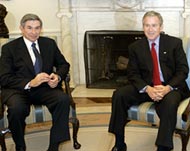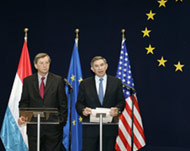Wolfowitz: Hawk or idealist?
When Washington nominated Paul Wolfowitz as the World Bank’s next president, it triggered an international outcry.

From aid agencies and politicians to the bank’s own staff, many have voiced concerns over the choice of one of the principal architects of the Iraq war.
The concerns were a measure of Wolfowitz’s notoriety – a man indelibly associated with one of the most unpopular conflicts in history.
Wolfowitz’s detractors say he lacks the experience to lead the World Bank and is likely to turn it into an instrument of US President George Bush’s foreign policy.
In short, a slap in the face of multilateralism, his detractors fear.
For the worse
Kert Davies, a research director at the environmental agency Greenpeace, told Aljazeera.net that Wolfowitz’s appointment will be “a real turn for the worse”.
 |
|
Bush firmly believes Wolfowitz is |
“He is right in the pocket of the Bush administration and linked with fossil fuel interests. We want a guy who is going to alleviate poverty, not align himself with Bush and the neo-cons.
“Is the World Bank now going to become part of Bush’s War on Terror? We are worried that this is part of a larger Bush agenda to subordinate international institutions to his will.”
But the US president, who handpicked Wolfowitz for the role of combating global poverty, is firmly backing his man.
On nominating the former undersecretary for defence, Bush said Wolfowitz “is a proven leader and experienced diplomat” and has devoted his career to advancing the cause of freedom.
“He is a person of compassion who believes deeply that lifting people out of poverty is critical to achieving that goal,” he added.
Washington insider
Wolfowitz, 61, has been a Washington insider for decades.
He first entered government in 1966 and during the early 1970s worked for the Arms Control and Disarmament Agency, focusing on nuclear non-proliferation issues.
He also led a parallel career in teaching, spending three years at Yale from 1970 to 1973 and later at the Johns Hopkins University in 1981.
“He is right in the pocket of the Bush administration and linked with fossil fuel interests. We want a guy who is going to alleviate poverty, not align himself with Bush and the neo-cons. Is the World Bank now going to become part of Bush’s War on Terror?” Kert Davies, |
Wolfowitz’s career progressed during the Reagan administration when he became assistant secretary of state for East Asian and Pacific Affairs in 1983.
Three years later he was appointed US ambassador to Indonesia – the most populous Muslim country in the world.
Wolfowitz’s supporters allude to his Indonesia tenure as proof of his experience with developing countries and his democratic idealism.
At the height of President Suharto’s autocratic rule, Wolfowitz pointedly told the Indonesian ruler that his record of rapid economic growth was not enough.
The statement was in line with the US envoy’s quiet pursuit of political and economic reforms, Wolfowitz supporters say, adding that he will bring those same values to the World Bank.
But his time in Southeast Asia was not without controversy.
He has consistently been criticised by Indonesian human rights activists for remaining silent for too long as Suharto repressed dissent and enforced harsh military rule.
On his return from Indonesia in 1989, Wolfowitz served as undersecretary for defence policy under Dick Cheney.
Middle East democracy
During those years, he was at the centre of a US administration faced with reshaping its military strategy at the end of the Cold War.
 |
|
Tens of thousands of Iraqis have |
His defence policy team played a key role in coordinating and reviewing US strategy in the first Gulf War.
He was also involved in creating two presidential initiatives that resulted in huge reductions in the US and Russian nuclear arsenals.
But it is Wolfowitz’s role in the build-up to, and the aftermath of, the 2003 invasion of Iraq that has earned him his fearsome reputation.
In the years preceding the invasion, Wolfowitz became known as the leader of the neo-conservatives – a group of intellectuals, academics and politicians who believe that no power should be permitted to challenge America’s dominance of world affairs.
Support for Israel
The neo-cons also became known for their unstinting support of Israel and preoccupation with Arab dictators.
In fact, Wolfowitz, who lost several members of his family in the Holocaust, has been accused of seeing the world through the Israeli prism.
Over the years, he also became one of the leading thinkers in the administration calling for the spread of democracy in the Middle East by the use of force, if necessary.
Immediately after the September 11 attacks, Wolfowitz called for the removal of Saddam Hussein, but was overruled the following weekend. Nevertheless, his view would prevail in due course.
Before the Iraq war, Wolfowitz famously predicted that the Anglo-American armies would be greeted with flowers and sweets in the streets of Baghdad and Basra.
Iraq conflict
Two years on, he argues the Iraqis are rid of the Baathist government and have taken a giant step towards democracy by electing a transitional National Assembly.
“Wolfowitz, like the president who appointed him, is an unapologetic proponent of liberal democracy and free-market economics, and he would most certainly like to see both take root around the world” Stephen Hayes, |
However, the number of Iraqis killed since the invasion is in the tens of thousands and the presence of foreign forces has been savagely opposed, claiming more than 1500 American lives.
Criticism of the invasion and its aftermath remains rife, and Wolfowitz has served as a lightning rod for the administration’s shortcomings.
Clare Short, the former UK minister for international development, summed up the feelings of many when Wolfowitz was nominated to lead the World Bank.
“They have nominated a man with no record on development, who drove the Iraq war and … was responsible for Iraq after the war – and that is a complete and absolute disaster, the worst post-conflict situation we have had in the world for a very long time.”
ActionAid International, a UK-based aid agency, is also concerned about the way Wolfowitz was appointed.
Democratic choice?
Spokesman Paul Collins told Aljazeera.net that the World Bank leadership should be decided democratically rather than by Euro-US backroom deals.
 |
|
Critics question if Wolfowitz will |
“The World Bank is the largest source of development funding for poor countries, and has an impact on the lives of millions of poor people. Yet these people are being given no say whatsoever in the selection process.
“The developed world can’t lecture the developing world about democracy if they are going to act like this.”
He added: “ActionAid is also worried that Wolfowitz will block moves to cancel multilateral debt and insist developing countries must privatise and deregulate industries.
“Is Wolfowitz really going to listen to the concerns of developing countries or is he going to adopt the usual ‘we-know-best’ attitude? Poverty has got worse over recent decades precisely because rich countries have insisted on opening up developing world economies before they are ready.”
‘Clear vision’
Nevertheless, there are prominent analysts outside the Bush administration who believe Wolfowitz is the right man for the job.
 |
|
Wolfowitz has a close working |
They say the appointment of such a high-profile figure shows that Bush is serious about development.
Wolfowitz has also been a strong advocate of debt relief for Iraq, lobbying the international community to give the post-Saddam government a fresh start.
The basic mission of the World Bank is poverty reduction, and Wolfowitz has spoken of achieving this through improving education and healthcare, providing equal opportunities and reducing corruption.
Moreover, Allan Meltzer, a prominent US political economist, believes the World Bank does not need “a development person”.
“There are plenty of people at the bank who do that,” he said in a recent interview.
“The critical dimension is management – the bank spends $15-20bn a year. I don’t think anybody would claim that money is well spent.
“The bank needs to find out what it does well, what it does badly. What do we do around here that works? How many people have we lifted out of poverty? … Those are not development questions, those are administrative questions.”
And Stephen Hayes, a columnist at The Weekly Standard – an influential US conservative magazine – says Wolfowitz’s clear vision and strong ideas are exactly what the World Bank needs.
“Wolfowitz, like the president who appointed him, is an unapologetic proponent of liberal democracy and free-market economics, and he would most certainly like to see both take root around the world,” he wrote in a recent article.
“That so many Europeans apparently find this objectionable says far more about them than it does about Wolfowitz.”